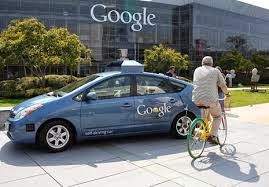Driverless Cars :
Imagine being able to work on your laptop, or video conference while driving to work. It may become a reality one day with the development of vehicles that drive themselves.
Your car will do the concentrating for you. Automakers are developing complex system that allow cars to drive themselves. They are also furthering existing technologies such as self-parking and pre-safe systems. You may even be surprised to find out your old clunker already sports some driverless technologies.
They are called autonomous vehicles, self-driving cars that allow the driver to let go of the steering wheel. They can change lanes, slow down in traffic jams, even park all by themselves.
In one demonstration, the driver actually gets out of the vehicle while the robot car pulls into an empty parking spot and turns off its engine. Later, the vehicle remembers the drop off spot and returns to pick up the driver.
Driverless cars will transport people through the streets of Milton Keynes from 2015, in the biggest test yet of the futuristic vehicles in Britain.
Vince Cable, the business secretary, announced that 20 of the vehicles will travel on special pathways separated from pedestrians around the Buckinghamshire town's shopping centre.
By mid-2017 it is planned that 100 fully autonomous cars will be in operation, sharing pathways with pedestrians and equipped with sensors to avoid collisions. The driverless pods, which can carry two people each and come with screen that allows passengers to check email and browse the internet while being ferried to their destination. The electric-powered pods can be booked via a smartphone app and will be able to accommodate two passengers. While travelling, they will use sensors to avoid obstacles.
In the automated versions, passengers travelling to their selected destination will be able to browse the internet, check emails, read the newspaper and play games inside the pod. The cost of each journey has not been decided. If successful, they could be used in other towns and cities across the UK, the government said. Google is among of the high-profile companies currently developing the technology. The cars of the future won't use magnets. Instead, they will be equipped with black boxes that allow vehicles to communicated with each other. They will have onboard cameras, radar and lasers to constantly scan obstacles around the vehicle.


